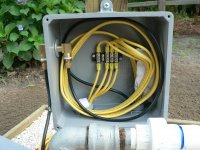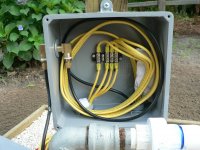TVL
Member
I just replaced the tank and pressure switch on my system. After replacing the tank and pressure switch, I decided to make some resistance checks to determine the "health" of the system. Everything appeared completely normal and within range except for the following:
Reading from the GROUND lead to each of the 3 motor leads gave a resistance value and I was expecting infinity or at least ohm values in the mega ohms -
Ground lead from the pump to Red motor lead:
Initial Reading ............... 1 minute later .............. 2 minutes later .............. 3 minutes later
~ 17K ohms .......................31.6k ohms ....................33.8k ohms .................... 34.3k ohms
Ground lead from the pump to the Yellow & Black motor leads produced about the exact same values as above. I'm speculating the connections at the pump are not water tight and this is why I'm getting the resistance values when reading each motor lead to the pump ground lead. When the pump was installed, I did utilize a "kit" for connecting the leads that also provided heat shrink with sealant that should have ensured things were water-tight. If my speculation is correct, this must NOT have occurred.
I am confident the feed cable insulation to the pump is in very good shape and is not worn or frayed. I truly believe I have water getting into the splices and we all know water or the impurities in water can conduct electricity ............... poor as it may be. And again, maybe most submersible pumps in most wells have the same issue I have discovered and it is not considered a big deal. My system runs perfectly and pulls the specified amount of current: 9.3 amps (1 HP pump motor) .............. and the ohm values between the 3 motor leads are well within the specified limits!
So, leave it alone? Or, rework the splices? If I rework the splices, I would like to purchase a good splice kit that is almost foolproof in making things water tight. What can you recommend?????????
Reading from the GROUND lead to each of the 3 motor leads gave a resistance value and I was expecting infinity or at least ohm values in the mega ohms -
Ground lead from the pump to Red motor lead:
Initial Reading ............... 1 minute later .............. 2 minutes later .............. 3 minutes later
~ 17K ohms .......................31.6k ohms ....................33.8k ohms .................... 34.3k ohms
Ground lead from the pump to the Yellow & Black motor leads produced about the exact same values as above. I'm speculating the connections at the pump are not water tight and this is why I'm getting the resistance values when reading each motor lead to the pump ground lead. When the pump was installed, I did utilize a "kit" for connecting the leads that also provided heat shrink with sealant that should have ensured things were water-tight. If my speculation is correct, this must NOT have occurred.
I am confident the feed cable insulation to the pump is in very good shape and is not worn or frayed. I truly believe I have water getting into the splices and we all know water or the impurities in water can conduct electricity ............... poor as it may be. And again, maybe most submersible pumps in most wells have the same issue I have discovered and it is not considered a big deal. My system runs perfectly and pulls the specified amount of current: 9.3 amps (1 HP pump motor) .............. and the ohm values between the 3 motor leads are well within the specified limits!
So, leave it alone? Or, rework the splices? If I rework the splices, I would like to purchase a good splice kit that is almost foolproof in making things water tight. What can you recommend?????????
Last edited:


